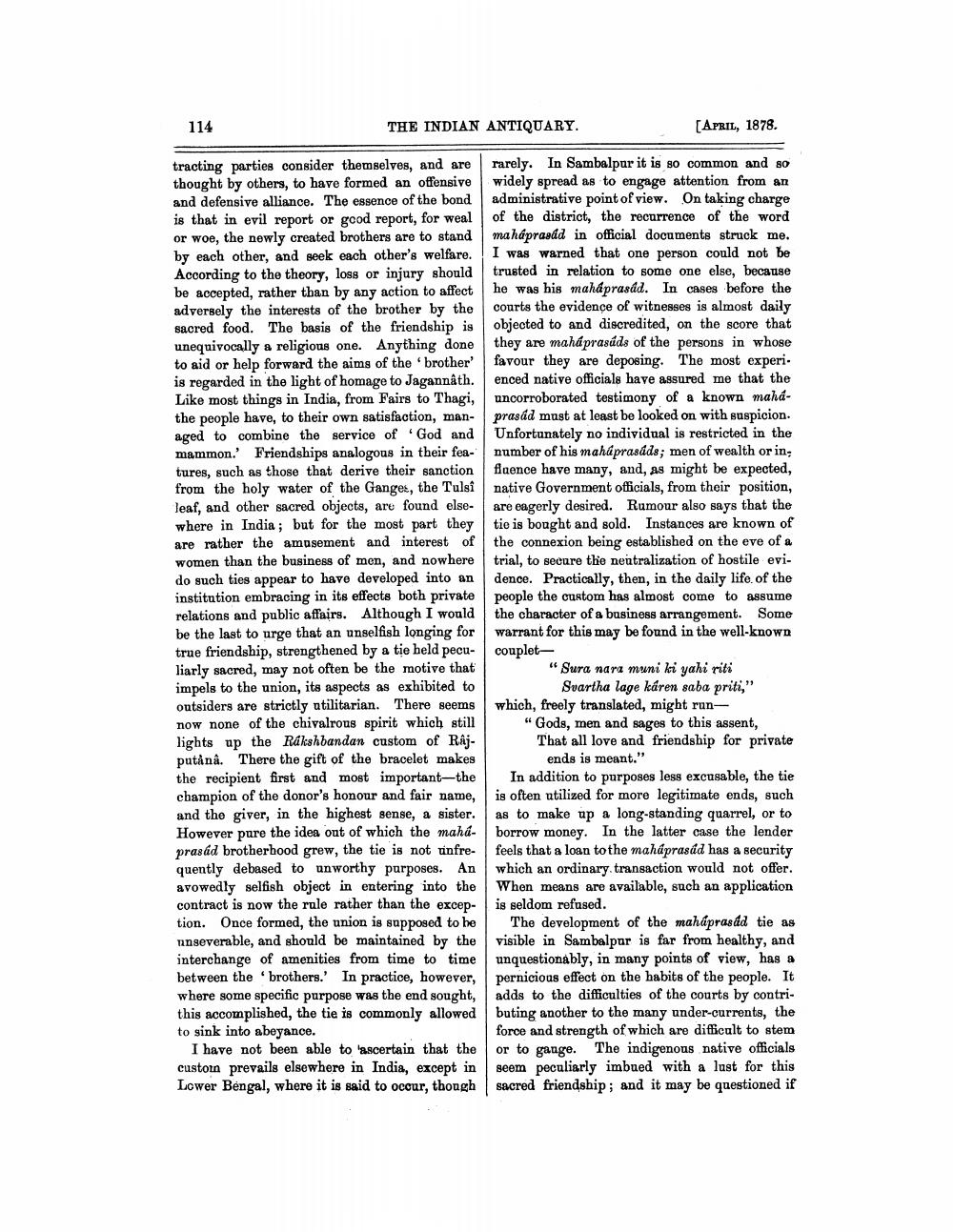________________
114
THE INDIAN ANTIQUARY.
[APRIL, 1878.
tracting parties consider themselves, and are thought by others, to have formed an offensive and defensive alliance. The essence of the bond is that in evil report or good report, for weal or woe, the newly created brothers are to stand by each other, and seek each other's welfare. According to the theory, loss or injury should be accepted, rather than by any action to affect adversely the interests of the brother by the sacred food. The basis of the friendship is unequivocally a religious one. Anything done to aid or help forward the aims of the brother' is regarded in the light of homage to Jagannath. Like most things in India, from Fairs to Thagi, the people have, to their own satisfaction, man- aged to combine the service of God and mammon.' Friendships analogous in their features, such as those that derive their sanction from the holy water of the Ganges, the Tulsi leaf, and other sacred objects, are found elsewhere in India ; but for the most part they are rather the amusement and interest of women than the business of men, and nowhere do such ties appear to have developed into an institution embracing in its effects both private relations and public affairs. Although I would be the last to urge that an unselfish longing for true friendship, strengthened by a tie beld peculiarly sacred, may not often be the motive that impels to the union, its aspects as exhibited to outsiders are strictly utilitarian. There seems now none of the chivalrous spirit which still lights up the Rakshbandan custom of Rajputånâ. There the gift of the bracelet makes the recipient first and most important-the champion of the donor's honour and fair name, and the giver, in the highest sense, a sister. However pare the idea out of which the maháprasad brotherhood grew, the tie is not unfrequently debased to unworthy purposes. An avowedly selfish object in entering into the contract is now the rule rather than the exception. Once formed, the union is supposed to be ungeverable, and should be maintained by the interchange of amenities from time to time between the brothers. In practice, however, where some specific purpose was the end sought, this accomplished, the tie is commonly allowed to sink into abeyance.
I have not been able to ascertain that the custoin prevails elsewhere in India, except in Lower Bengal, where it is said to occur, though
rarely. In Sambalpur it is 80 common and so widely spread as to engage attention from an administrative point of view. On taking charge of the district, the recurrence of the word maháprasdd in official documents struck me. I was warned that one person could not be trusted in relation to some one else, because he was his maháprasád. In cases before the courts the evidence of witnesses is almost daily objected to and discredited, on the score that they are maháprasáds of the persons in whose favour they are deposing. The most experi. enced native officials have assured me that the uncorroborated testimony of a known mahdprasád must at least be looked on with suspicion. Unfortunately no individual is restricted in the number of his maháprasáds; men of wealth or in, fluence have many, and, as might be expected, native Government officials, from their position, are eagerly desired. Rumour also says that the tie is bought and sold. Instances are known of the connexion being established on the eve of a trial, to secure the neutralization of hostile evidence. Practically, then, in the daily life of the people the custom has almost come to assume the character of a business arrangement. Some warrant for this may be found in the well-known couplet
"Sura nara muni ki yahi riti
Svartha lage káren saba priti," which, freely translated, might run
“Gods, men and sages to this assent, That all love and friendship for private
ends is meant." In addition to purposes less excusable, the tie is often utilized for more legitimate ends, such as to make up a long-standing quarrel, or to borrow money. In the latter case the lender feels that a loan to the maháprasád has a security which an ordinary transaction would not offer. When means are available, such an application is seldom refused.
The development of the maháprasad tie as visible in Sambalpur is far from healthy, and unquestionably, in many points of view, has a pernicious effect on the habits of the people. It adds to the difficulties of the courts by contributing another to the many under-currents, the force and strength of which are difficult to stem or to gange. The indigenous native officials seem peculiarly imbued with a lust for this sacred friendship, and it may be questioned if




